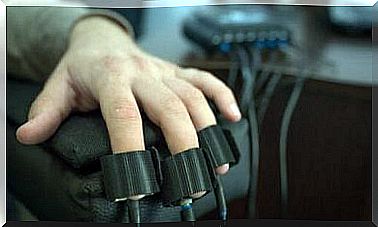All About The Consequences Of Sleep Deprivation

Sleep deprivation is common in teens and adults. In a world saturated with instant gratification, overstimulation, and lack of patience, basic necessities such as sleep are often put on the back burner.
The constant changes in working hours and the different artificial lighting and technologies that are present everywhere amplify this.
The consequences of these changes manifest themselves on different levels, such as cognitive, emotional and biological. Today, the time has come that new conditions are emerging, such as the syndrome of insufficient sleep. Everything is a priority in this society, but sleep is not one of them.

The Sleep Process
Sleep is an essential physiological state. It implies a decrease in alertness and awareness to develop processes of integration of brain activity and modify physiological processes. In addition, the circadian rhythm aids in the alternation between wakefulness and sleep.
It is also important to know that there are two important stages of sleep that must always occur in the same order.
The first stage is NREM sleep, in which there are no rapid eye movements. It is divided into four stages:
- NREM1. A light sleep in which a person can wake up easily and still perceive internal and external stimuli.
- NREM 2. Here a blockage of sensory access in the body occurs, causing muscle tension and heart rate to drop. Also, the brain waves begin to sink, so that the brain calibrates its activity.
- NREM 3. In these, the brain waves continue to decrease and the sensory blockage is greater. Growth hormone production increases.
- NREM 4. This and the previous stage are the phases of deepest sleep and there is a predominance of delta waves.
The second is REM sleep. The presence of rapid eye movements is the main feature. Here the muscle tone decreases and the breathing and heart rhythm become irregular. This is the time during sleep when the brain is most active and lucid dreaming occurs with a conductive wire.
Brain activation and sleep deprivation
Cerebral imaging showed a global reduction in brain activity when a person’s sleep time decreased.
Despite this, the scientists specified that the largest decrease in this activity occurred in the prefrontal cortex and in the parietal lobe. This measurement was specific to verbal activity, and researchers think it’s a result of the brain’s extra work as it tries to stay awake and alert.
Does sleep deprivation affect your cognitive functions?
Today it is clear that sleep is essential for good cognitive functioning during the day. Researchers found that a decrease of 1.3 hours of sleep per week in one week leads to a 32% decrease in the level of alertness. This has consequences for both physical and cognitive activities.
Memory and learning
Memory and learning are processes associated with good sleep. Scientists have found that the information people acquire during the day is consolidated during sleep. Sleep is also essential for learning.
Therefore, a reduction in daily sleep affects these functions. There are several aspects of memory associated with the different stages of sleep within the studies mentioned.
For example, the consolidation and encoding of new information in the memory depend on the REM sleep and the NREM 2 phase. Not being able to complete all these phases thus creates problems for the consolidation of memories. The effects can translate into, for example, poor academic performance.
There is also a connection with learning new information. In this case, lack of sleep reduces the activity of the hippocampus, a vital structure for encoding memory. So it is also an obstacle to retaining information.
Attention
Researchers also found that sleep deprivation leads to daytime sleepiness, directly affecting the person’s attention. This is where perception declines, usually causing the relevant elements needed to perform an activity to be lost or omitted.
It is also difficult to stay focused on the same activity for long periods of time. Adding to that the increase in your reaction time can cause a problem, such as a traffic accident or failing a test.
Response time
With a lack of sleep, the reaction time usually increases significantly. There is also a greater chance that someone will make mistakes in certain activities. So a person needs more time to do something and even then he or she may have trouble following it properly.
This affects multiple facets of life, such as academic performance, as it can lead to him or her not understanding or performing a task properly. You can also see problems with automated activities, such as driving. This is because they may not react quickly enough in a day-to-day situation.
Does Sleep Deprivation Affect Emotional Mood?
This is another important aspect of sleep deprivation. Researchers found that sleep deprivation causes temporary changes in mood, triggering feelings of depression and anxiety in a person.
Also, little sleep affects your emotional intelligence and constructive thinking. It has different outcomes. The first is intrapersonal functioning. This is because sleep deprivation reduces assertiveness, sense of independence, and personal growth.
The second is that it affects interpersonal functioning because it reduces empathy for others, along with the quality of your relationships. Scientists have found that there is a decrease in recognizing emotional gestures related to joy and anger. As a result, it has a significant impact on your relationship with others.
Finally, there are problems with good stress management. Therefore, a sleep-deprived person has difficulty controlling certain impulses in such situations. There is also a delay in the activation of the gratification system, which can increase the stress during the onset of certain situations.
The relationship between sleep deprivation and physiological activities
Sleep is closely linked to physiological activities and it is important to regulate your cognitive, emotional and physical activity. Among the main systems:
- immune system. Sleep deprivation weakens your immune system and forces the organs to work harder, increasing your risk of getting sick.
- Cardiovascular. Researchers found that people with sleep problems are at greater risk of high blood pressure, heart disease and heart failure.
- endocrine. Sleep deprivation raises cortisol levels and lowers thyroid hormones. As a result, there is a greater risk of obesity, diabetes and chronic fatigue.

Sleep disorder
This is a condition where a person does not get the sleep they need at night to stay alert during the day. It is not biological in origin, but due to external factors. Mainly it is due to a voluntary sleep restriction dictated by other interests at play, such as having fun or working overtime.
This is common among teens and college students as many are often tired during the day. They also need help getting up in the morning, so as not to do it too late.
Some of the factors associated with sleep deprivation include:
- the changes during adolescence
- the use of electronic devices (English link)
- schedules and academic load
- the use of stimulants
- emotional problems or stress
Conclusion
Finally, let’s emphasize that you should sleep as much as you need. As you can see, not sleeping has negative emotional, cognitive and physical consequences. Therefore, sleep is fundamental to your performance on many different levels, not only physically but also mentally.
As you can see, you need to think about the risks of too little sleep. So make it a point to prioritize sleep over other activities. In the long run you will feel the result of such effort in your body and you will feel great about it.









